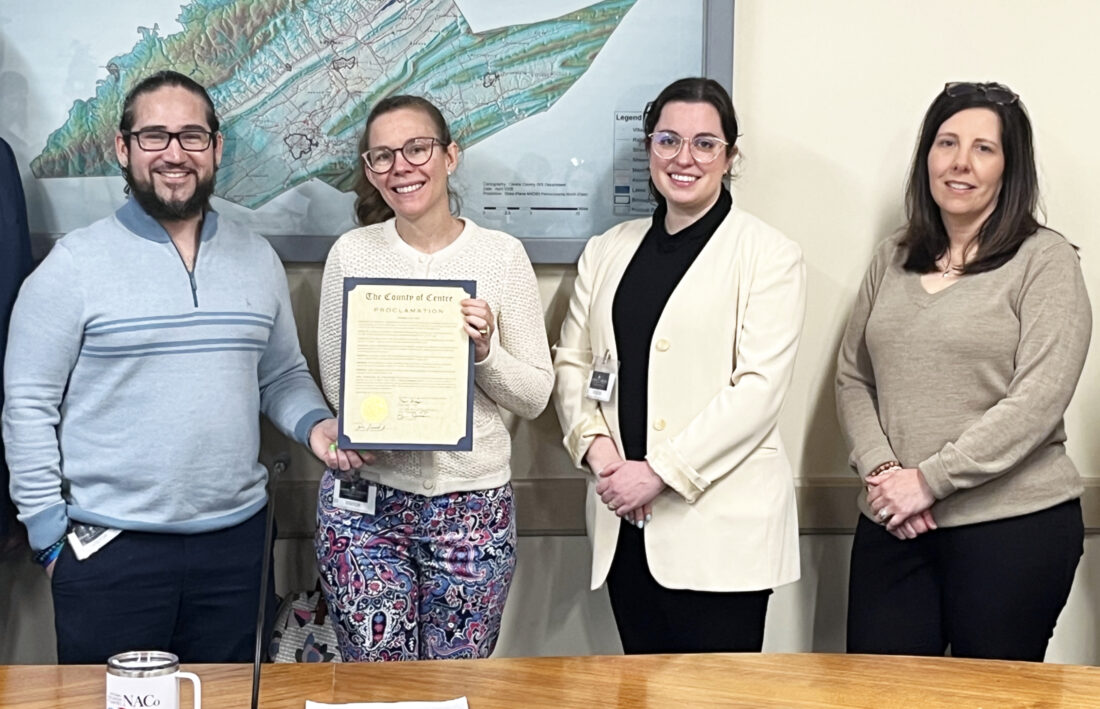
This recent news story about a proclamation supporting Penn State's Restorative Justice Initiative's Justice Education Week in Centre County, Pa. features SSRI co-fund Brandy Henry.
During this week’s Centre County Board of Commissioners meeting, the commissioners proclaimed April 14-21 as Justice Education Week in the county.
In attendance was Karri Hull, Criminal Justice Planning Director, who introduced members of the Restorative Justice Initiative at Penn State University. Those members were: Efrain Marimon, Restorative Justice Initiative Director; Liana Glew, Prison Education Program Manager; and Brandy Henry, Rehabilitation and Human Services Faculty Liaison.
The Restorative Justice Initiative is a group of Penn State students, faculty, staff and community stakeholders committed to empowering and supporting system-impacted, currently and formerly incarcerated individuals through education and meaningful civic engagement.
“Here in Centre County we take Criminal Justice very seriously,” said Chairman Mark Higgins, “(The county) places large resources well beyond the state mandated minimums into criminal justice planning… over the last decade we have reduced the number of Centre County residents incarcerated at the Centre County Correctional Facility by 50%. We’d like to thank your group for your part in helping us do that and all of the other nonprofits and allied groups we work with.”
Marimon took to the podium and described the different events taking place this week to celebrate Justice Education in the county. The full schedule and more detailed descriptions of these events can be found here: psu.edu/justice-education-week.
“As part of the Restorative Justice Initiative what we do is bring awareness to the impact of incarceration by either supporting programing directly in multiple correctional facilities — which includes Centre County Correctional Facility,” said Marimon.
“One of the things we’re really proud of in Centre County is moving ahead with a lot of initiatives that directly influence folks who are under our care in the Correctional Facility. When you see the huge numbers of folks who have either drug and alcohol issues, mental health issues or co-occurring disorders, we’ve been very aggressive in trying to find ways to get them treatment while they’re in our care and continue that treatment once they’ve left our custody,” said Commissioner Steven Dershem.
The idea behind Justice Education week is to create awareness for the issues that impact individuals who have been affected by incarceration.
On April 14, the RJI held an art benefit where various local artists were invited to display their artwork and speak about the different components of incarceration; a “myriad of issues and images (were discussed)” according to Marimon.
“(Monday) we had our Keynote speaker,” began Marimon. “(Tuesday) we have a reentry job fair that we’re co-hosting with CareerLink. (Wednesday) we have ‘College Behind Bars’ — part of what we do is a prison education program, (Dr. Glew) is working really hard to have a credit attached to the work we’re doing in correctional facilities. It’s a webinar, if you can make it.”
On Thursday, April 20, from 2-5 p.m., the RJI will be having a reentry simulation at Penn State’s HUB. The main takeaways from this event will include barriers to reentry, and a simulation where participants are in the shoes of formerly incarcerated individuals.
Vice-Chair Amber Concepcion said, “Thank you for these education efforts. This is probably really important for students at Penn State as well to get this kind of understanding of the impacts of the Criminal Justice System… We want good people to be interested in jobs in this area so that we’re able to make a positive difference in the lives of returning citizens.”
“One of the things I’m most proud of,” said Dershem, “is working with our Criminal Justice System and our court here locally. We’ve initiated mental health court and drug and alcohol programs that the court oversees that really put teeth into the project of getting people into treatment and onto the right path as they reenter society… It’s not just warehousing people anymore. We’re giving them job skills, mental health (help) and other treatment.”